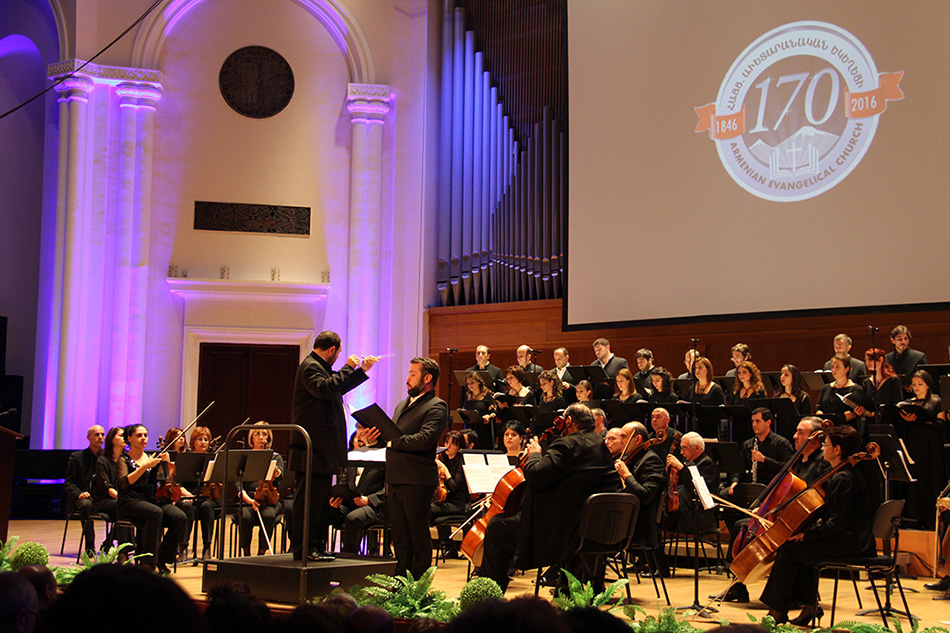It’s when The Promise begins its wide release to theaters across the United States.
That the film will open is a feat all to its own.
The picture, financed by the late Fresno native Kirk Kerkorian, directed by Terry George (Hotel Rwanda, In the Name of the Father), and produced by Eric Esrailian, took a long and circuitous route to the cineplex.
The Promise stars Oscar Isaac (Star Wars, Episode VII: The Force Awakens), Christian Bale (American Psycho, The Dark Knight Trilogy) and Charlotte Le Bon (Yves Saint Laurent, The Hundred-Foot Journey) in a love triangle set behind the backdrop of World War I-era Ottoman Turkey. Isaac stars as Michael, a medical student who arrives in Constantinople, where he meets Christopher Myers (Bale) and Ana (Le Bon), an Armenian of Parisian upbringing.
The film follows the three as the Young Turk government leading the Ottoman Empire begins its campaign of mass deportation and annihilation of Christian Armenians.
Those vaguely familiar with the Armenian Genocide will note the appearance of James Cromwell as an uncanny representation of Henry Morgenthau, Sr., the American Ambassador to the Ottoman Empire during World War I.
I am a third generation Armenian American, the great-grandson of survivors of both the Armenian Genocide and the Hamidian Massacres (which preceded the Armenian Genocide just prior to the turn of the 20th Century).
Like many Armenians living in diaspora, I have made it a point to educate friends, family, and colleagues alike of the Armenian Genocide. It’s the reason my last name is spelled the way it is. It’s the reason I grew up in Fresno rather than along the placid waters of Lake Van.
For me and scores of others, The Promise offers a teaching tool that has never existed before.
Arriving at the dawn of a new wave of mass communications, the stories of horror and strife emerging from the Caucuses during the Armenian Genocide were tailor-fit for the silver screen.
Yet, The Promise serves as the first major motion picture entry recounting the first genocide of the 20th century.
To understand the significance of a major motion picture about the Armenian Genocide, one would need to turn the clock back to 1933, when Austrian author Franz Werfel published The Forty Days of Musa Dagh, a novel detailing the strife between defending Armenians and Ottoman aggressors. Aside from the papers and cables of Morgenthau, Sr. to the State Department from Constantinople, Werfel’s Forty Days of Musa Dagh is likely the work of the highest impact and significance regarding the Genocide culled from the period.
Shortly after its publication, MGM purchased the rights to produce the film adaptation of Forty Days. As MGM commenced pre-production in 1934, the newly-formed Republic of Turkey began its first campaign to muzzle mass references to the atrocities.
The Turkish Ambassador at the time, Mehmed Münir Ertegün, drew the line in the sand with MGM officials: “If the movie is made, Turkey will launch a worldwide campaign against it.”
Under pressure from Ertegün and the State Department, MGM studio boss Louis B. Mayer killed the film. MGM eventually sold its rights to the novel, and it has never been acquired by a major studio since, despite interest by both Sylvester Stallone (who promoted The Promise by noting his interest in the subject of the Armenian Genocide) and Mel Gibson to create films either based entirely on or inspired by Werfel’s seminal work.
Both 1980s superstars and MGM faced the same heat from Turkish officials as the studio did 50 years prior.
If one was looking for proof positive that 80 years of threats against movie studios weren’t idle, the initial response to The Promise all but guaranteed it.
Before it was picked up by distributor Open Road Films (distributor of Oscar Best Picture winner Spotlight), the picture was shown at the Toronto International Film Festival in three screenings.
Shortly thereafter, the IMDb page for the picture received a flurry of nearly 100,000 votes, most were one-star reviews originating from outside North America.
Of course, though sizable audiences saw the yet-to-be distributed film in Toronto – they paled in comparison to the number of reviewers visiting the film’s IMDb page.
It didn’t take long to figure out the culprit. It was the modern Turkish denial machine coming in to suppress any acknowledgment of the Armenian Genocide.
While it caught some of those inside baseball in Hollywood by surprise, to Armenians with an internet connection, this was hardly a new discovery.
A friend had forwarded it to me with incredulity. Few things boiled my blood more than that letter. I sat down and in the course of 20 minutes, I penned a scorching hot retort and sent it off.
It became one of the most-read letters to the editor in The Bee last year.
In it, I wrote that “I am and will always be proud to be an American, in good days and bad. But I wouldn’t be here writing this today if it weren’t for my great-grandmother, an Armenian Genocide survivor.”
Naturally, the entire letter holds true nearly a year later. But that line, in and of itself, is most poignant. I truly wouldn’t be living in the most incredible place in the United States of America without tragedy.
The Promise is a victory in a longstanding battle of denial.
This week, I’m looking forward to stepping into the cinema ready to delve into a story that has been retold to me many times before, but now reaches the consciousness of neighbors, friends, and even total strangers, for the for the first time ever.
I am thrilled to keep the promise.
Alex Tavlian is the publisher of CVObserver and owner of Sultana Media. Views expressed reflect those of the author only. He can be reached at [email protected]










